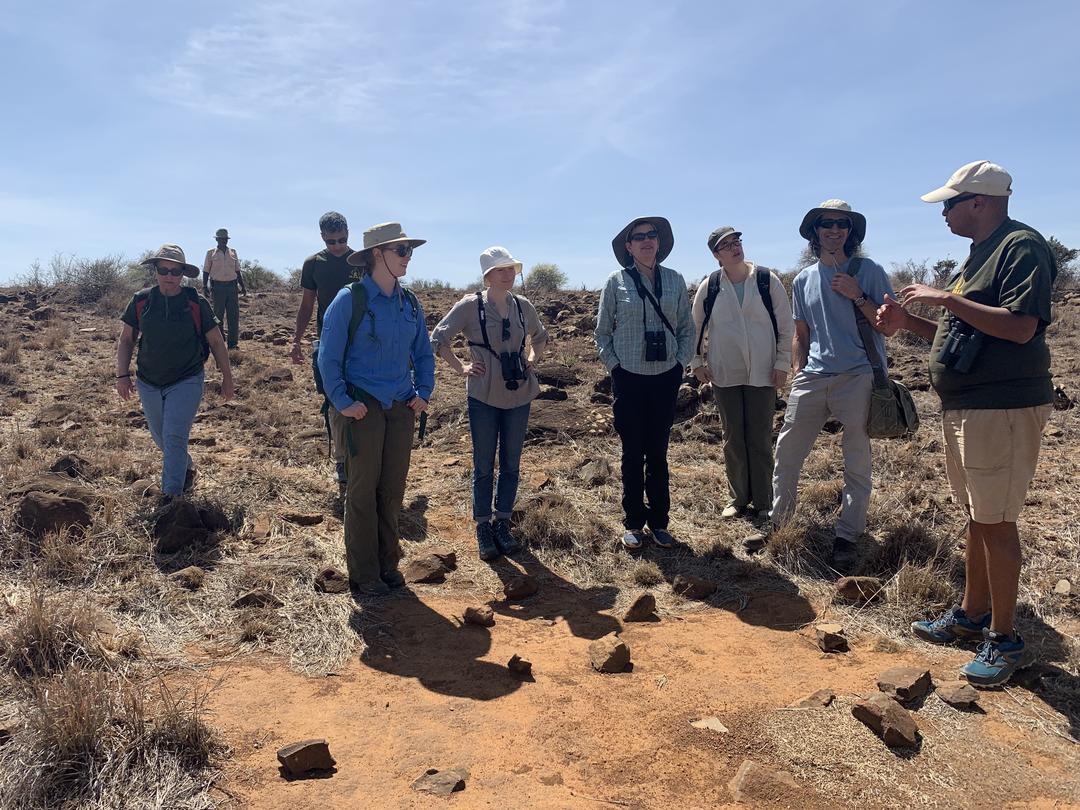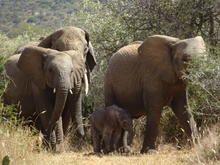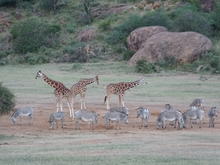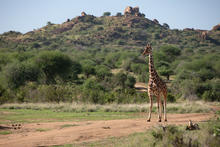As the Mpala Research Centre Approaches its Third Decade, A Multidisciplinary Focus Emerges

In March, anthropology professor Agustín Fuentes was among a small group that visited the Mpala Research Centre, a 48,000-acre living laboratory nestled in the heart of Kenya. During a tour of a possible archeological site, Fuentes almost immediately spotted what looked like a roughly 2-million-year-old stone tool. All at once, he spotted several more scattered about. With him was Assistant Professor of Geosciences Elizabeth Niespolo, who often helps determine the age of stone tools and fossils by dating the rocks and minerals that turn up alongside them. “It was clear to me that these things have been washed out from actively eroding soil, and it’s very likely there’s a lot more,” she says, especially given the center’s proximity to other fossil-rich sites in Kenya.
Fuentes, who has been a Princeton professor since 2020, sees more than just rare archaeological specimens in the offing: “There’s an opportunity to have research at Mpala that contributes to the grand narrative of human evolution and our broader understanding of what makes us us.” But, he says, while that eroding soil could unlock secrets of our past, he is equally concerned about how his findings might improve life for modern Kenyans.

That experience and Fuentes’ emphasis on using research to engender positive changes for Kenya reflect the twin intentions of the trip: to build up a more multidisciplinary scope of research at Mpala and to do so with the aim of encouraging more African scientists to undertake research there while also ensuring that the center’s research will benefit Kenyan people and wildlife. Associate Provost for International Affairs and Operations Aly Kassam-Remtulla, who oversees the research center and serves as chair of its board of trustees, convened the journey. “A lot of the research that has taken place at Mpala over the years has been in the life sciences,” he says. “That work is foundational, and we want to continue to invest in it. At the same time, the goal of this trip was to give faculty members in other disciplines — especially the social sciences and humanities — an opportunity to explore how they might do research projects or teach or engage with the community there.” Kassam-Remtulla is planning at least two more trips this year, so that Princeton administrators and multidisciplinary scholars can become acquainted with the center.
In addition to Fuentes and Niespolo, the group on the March trip included: Visiting Research Scholar Ethan Kapstein, an economist and co-director of the Empirical Studies of Conflict Project; Erika Milam, professor of history specializing in the history of modern life sciences; Andrea Graham, professor of ecology and evolutionary biology (EEB), then a co-director of the Program in Global Health; Senior Associate Dean of the Office of International Programs Rebecca Graves-Bayazitoglu; and Associate Director for International Affairs in the Office of the Provost Grace Penn.
Niespolo and Fuentes have secured funding for an anthropological, geological and hydrological survey of the center’s entire 48,000 acres, in collaboration with Kenyan scientists and Mpala staff. Kapstein, of the Empirical Studies of Conflict Project, says Kenya has been experiencing “its worst draught in decades [and] periods of drought in the developing world tend to be associated with higher levels of conflict.” His team — which includes Princeton EEB Professor Dan Rubenstein, Tufts professor Steven Block, Princeton Ph.D. candidate Fiona Bare, Carson Maconga ’22 and junior Meera Burghardt — has just begun researching water-based conflict throughout Laikipia County, where Mpala is based, thanks to seed funding from Kassam-Remtulla’s office. “Like the world generally, Kenya is witnessing climate change,” says Kapstein. “One form it’s taking is severe drought. I can attest to it because I was walking in riverbeds in Laikipia County that were absolutely empty.” Kapstein hopes to use the help of Mpala staff, local NGOs and local conservancies as part of their data gathering to gauge attitudes about water — both when it’s plentiful and again when it’s scarce — then share their findings with the local community and the Kenyan government to hopefully engender meaningful change.
Graham, the EEB professor who co-directed the Program in Global Health, learned through conversation with local clinicians about current health challenges facing local communities as well as obstacles to offering preventative health screenings. The clinicians and Princeton-affiliated researchers are now considering how both health research and public health messaging campaigns could be run out of Mpala. Meanwhile, Milam saw the potential for a rich history of Mpala that explores the multiplicity of land uses on site, from hand axes to exclosure grazing quadrants, through oral history interviews with the expert staff and scientists who live and work there.

Graves-Bayazitoglu, who oversees the Office of International Programs, came away convinced there are several opportunities for greater undergraduate engagement: “It was exciting to realize the manifold ways in which undergraduates could engage with not just the science that was being done there but really with all of the questions around land use, land management, political-conflict, the history of Kenya and what was happening in those areas throughout the 20th and 21st centuries.”
Kassam-Remtulla says that building capacity of local researchers is among his key priorities for the center. (Mpala is technically a Kenyan NGO, but Princeton is the managing partner responsible for stewardship of its governance, operations and finances.) “We are creating what we hope will be the world’s most diverse and inclusive research community,” he says of the center. “Over the last number of years, we have increased the number of scientists from Kenya and other parts of the continent, including Uganda and South Africa. In 2021, 60 percent of papers published based on research conducted at Mpala included a Kenyan co-author. We want to accelerate that success and create an environment where we are attracting top researchers from Africa and beyond and benefiting from deep, authentic collaborations that start with the conceptualization of projects.”
Last year, Kassam-Remtulla created an Mpala Advisory Council, in part to ensure that the knowledge production at the center continues to be as equitable as possible: that local collaborators are engaged and duly credited and that findings are disseminated to the betterment of the country.
“You cannot overemphasize that this is important research that's going on at Mpala,” says Director of the Program in African Studies Chika Okeke-Agulu, who serves on the council. But, he adds, the forthcoming work of the advisory council is pivotal to guaranteeing Mpala-based research continues its drive to be at the vanguard of ethical and collaborative research. Says Okeke-Agulu, “the [Mpala] Board of Trustees, from every indication, is now taking some of these questions head on … especially how do you bring in more Kenyans, more Africans to be fully involved in the work of Mpala?”
Noting that while researchers from across the globe — not just Princeton affiliates — can work at the center, Kassam-Remtulla says scholars looking to conduct fieldwork there must cover the costs of their lodging and use of the facilities onsite. “We want to acknowledge and reduce barriers to entry that some scholars may face. Through subsidies and fundraising we can level the playing field.” He says, “We want to enhance the pipeline of Kenyan and African scientists who are doing research there.”
Mpala was founded in 1994 on land donated by George Small ’43, who wanted to see the former cattle ranch transformed into a research center. It began as and remains a partnership among Princeton, the Smithsonian Institution, National Museums of Kenya and the Kenya Wildlife Service. The center comprises an extensive array of ecologically sustainable facilities, including a genomics lab — the only one of its kind in a field setting in sub-Saharan Africa — staffed entirely by Kenyan scientists. The acting executive director and chief operating officer of Mpala Nelly Palmeris says that the collaborative spirit already present at the center only helps this effort. When COVID-19 left many of Mpala’s principal investigators homebound, knowledgeable Kenyan partners on site carried research forward.

“When every other conservancy around us was scaling down, we were abuzz with activity. We were busy because Kenyan researchers kept the projects going,” says Palmeris of the center’s 250-some staff. She adds that many employees have been elevated through the ranks, from driver to research assistant, for example, and that thanks to Mpala’s outreach to a local university, a process is being formed whereby some employees who have assisted professors for years can formalize their knowledge with degrees.
For the researchers who visited the center in March, the notion of ethical research is not only an idea whose time has come, it also aligns with the University motto’s emphasis on the service of humanity.
“The Princeton-Mpala collaboration is an opportunity to lead, as a university from the Global North, in developing a collaboration that is meaningful, honest and sincere,” says Fuentes. “It can teach us a lot about how to have sustainable relationships with ecology. And most importantly, it can teach us how to do research in a just, fair, equitable and mutually beneficial manner.”
